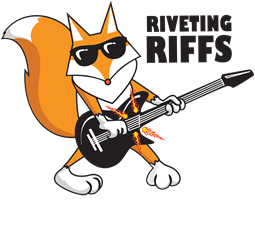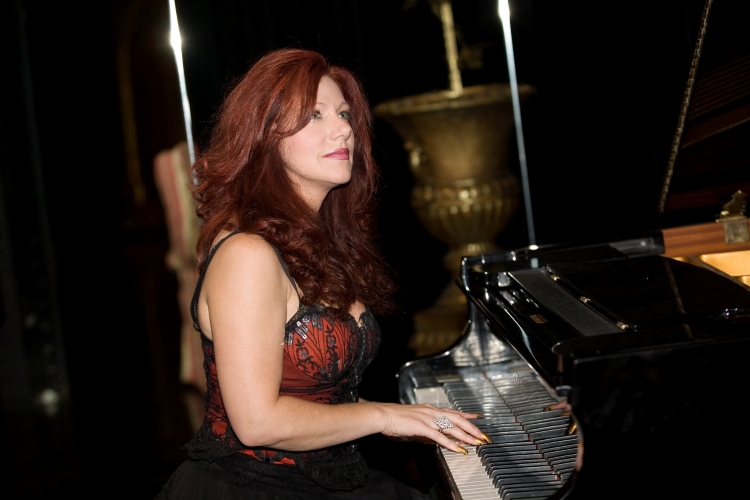

 |
Lucy Gale Releases It's Never Too Late  |
|
On May 24 th in Australia at the JazzLab a sold-out audience gave
singer, songwriter, Lucy Gale a standing ovation as her album
It’s Never Too Late made it’s debut. This collection of
songs plays to Gale’s
soulful, bluesy vocals and for the recorded album, helmed by producer,
composer and keyboardist Dominic Ross, she surrounded herself with some
superb musicians, drummer Darryn Farrugia, bassist David Rosa, organist
Harry Mullany (who also contributed vocal harmonies) and guitarist
Dragan Stanic. They were complimented by saxophonist Gary Deleo,
percussionists Alejandro Vega and Sam Oliveri, as well as guitarists
Eddie De Marchi and Ben Dewhirst. Adam Calaitzis served as the sound
engineer and mastered the record at Toyland Studios.
Songs like “It’s Never Too Late,” seek to rekindle how love first felt
or perhaps get back a love lost, and the
breathtakingly beautiful “Turn Up That Love Song,” remind us of
how we felt or may still feel when we are so in love with another that
those emotions and feelings burn within us. This latter song should be
in a scene for a movie or series, so pay attention music supervisors.
The song is beautifully sung, arranged and orchestrated. Rather than
overpowering the singer, as so many instrumentalists sometimes do, the
musicians compliment Lucy Gale in a way that if you close your eyes, you
imagine them dancing slowly together or perhaps, as you listen to this
song you are dancing with that special someone. For 6:16 (song length)
turn down the lights, close your eyes and fall in love all over again.
“I wanted it (the song) long, but we also have a shorter version, so it
can be cut. They wouldn’t play it for that long on the radio. There is
no way, but I wanted it long. On some radio stations here in Melbourne
they played my songs and they don’t ask me if I had a shorter version.
As for “It’s Never Too Late,” she says, “It is about a fresh start,
something fresh, something new. I wrote “It’s Never Too Late,” because I
believe in life, that nothing is too late. Love can come at anytime in
your life. In the future, in the past, being with that person is so
special I can hear the songbirds singing. I am in that moment. You are
in that moment being really happy. I think you get it when you heard it,
because the words in that are so profound and powerful. As you get older
it gets better and life gets better. You learn from things that happen
in your life. For me, because you get older it doesn’t mean it is the
end, if anything it is positive and it is never too late to love.
It is never too late to feel that special person in your life, that
special feeling maybe you never had or something that you never
experienced. It could be anything really. It is not so much the person,
it is a special something.
With Domenic who produced this album, we (created) it together. I wrote
it lyrically and musically, but Domenic composed it.”
As for those soulful vocals we talked about earlier we had a surprise
coming our way.
“I didn’t speak for six years when I was born. I didn’t make a sound for
six years. There was nothing. My mom was worried. They call it the
Einstein syndrome (editor’s note: Yes, it is a real thing), because I
was a late talker, but gifted. The first (sound) I made was in song. My
mom used to sing to me, honey, honey will you kiss me and when she sang
to me as a little girl that is what she sang to me. Then one day she
said she heard in the house, honey, honey will you kiss me. When she
walked in, I was singing (those words) in perfect pitch.
It wasn’t like I grew up and thought I want to be a singer. I didn’t
even ask myself what I wanted to be when I grew up. When I sang (as a
child) my father would put me on the radio when I was seven years old.
There was a lady who said to me I am (going to) train you and she
trained me for about nine years.”
By the time she was ten, she had joined her brother, who was a pianist,
when he was playing in a Melbourne restaurant and she would sing,
performing an hour long show every Saturday night. She would be singing
songs by Shirley Bassey and other notable singers of the day. So, just
how does a ten-year-old identify with a song of that ilk?
Lucy Gale says, “You are one hundred percent correct.
I would sing the words, but I wouldn’t identify that type of
love, because I didn’t know it. I would identify the emotion of what the
words were. I also sang songs like “You’re just too good to be true (and
she sings a few more lines) and stuff like that. I would sing it to
the man and I would sit on his knee and I would look at his wife. What
did I know as a ten-year-old little girl. People would keep coming
back.”
The introspective “When Heaven Arrives,” is a deeply personal song that
was inspired by a combination of personal experiences in Lucy Gale’s
life and those of others, caring for her mother-in-law, her husband
Andrew’s father passing when he
was seventeen and listening to both of them talk about Andrew’s father’s
love for his mother and listening to her say the same things. It is
about where do we go when we pass from this life, who is waiting for us
and what will it be like?
Responding to our question concerning if an apt description for this
album would be describing it as a collection of love songs she says,
“That’s a great statement to make.
I like writing songs about love. It is an emotion. It is an
emotion about how I feel or about somebody who has just gone through
something.”
“If You Believe,” is the centerpiece of this album, as far as we are
concerned. It is a powerful song of hope that has a definite Pop feel to
it and the arrangement allows Lucy Gale’s voice to shine. It is that
anticipation of love or the knowing that you have found love. It is that
feeling of being alive when the fairytale ceases to be someone else’s
and it becomes yours, “To love somebody who loves me.”
It is worth purchasing this album simply to have this song. We
can imagine concertgoers singing the words to the chorus back to Lucy
Gale.
Lucy Gale who is Maltese and born Lucianne Rose Galea, grew up in
Melbourne, Australia and into a musical family. Her already mentioned
brother played piano and her father played trumpet, of which she says,
“He wasn’t great, but he did it for the love of it.”
Continuing she says, “In Australia, we almost had separation between the
Aussies and the Europeans. If you were European, oh you are European, we
don’t really want to (bother with you), so a lot of musicians and
artists changed our names. I changed my name. I cut off the “a” and made
it Gale and the Australians thought I was born here. A lot of them
couldn’t pronounce Lucianne Galea, so I changed it to Lucy Gale. I made
it very easy for people to introduce me as an Australian.”
“Black Heart,” is the song the song from the album that comes to the
closest to being a Rock song and depending on how you lean you can refer
to it as a Pop song with some raw Rock edginess or you can refer to it
as Rock song with strong Pop elements. Either way it is a good song, a
powerful song and another long one at 5:50. We will take time here to
make a more general editorial comment, as we are in the latter days of
what has sometimes been referred to as terrestrial radio (where are the
other stations in outer space?), or what we prefer to call more
traditional twentieth century radio, the length of songs being limited
to between 2:30 and 3:30 seems much more in the past than catering to
listeners’ current musical tastes. With a plethora of musical platforms
to stream from today, and it is debatable if that helps the artist
economically either directly or indirectly, that for the most part the
boundaries are few when it comes to the length of a song.
“With Black Heart, my cousin went through something. She married someone
one day and realized basically the next day that he was a fraud. It was
painful and it was awful,” says Lucy Gale.
She elaborates on the origins for the song and it also was, inspired
sounds like the wrong word to use here, it was born out of her own
experience with an abusive situation.
“I took years off and I was in pain and I cried a lot. I had to heal a
lot. I wrote “Black Heart,” about what women on this planet go through,
especially women who have been raped, women who have been abused, women
who are misunderstood. For me that is (what the song is about). I wrote
it like hell has no fury like a woman’s scorn. That is the first line in
my second verse.”
All but three of the songs for the album It’s Never Too Late, had
lyrics written by Lucy Gale and composed and arranged by Dominic Ross.
The only ones I didn’t write were, “You Can Have Me Anytime,” “I Can’t
Make You Love Me,” and a
cover of “I Just Wanna’ Stop,” (recorded by Canada’s Gino Vanelli).
You can follow Lucy Gale on
Instagram here and listen to her
new album on YouTube.
#LucyGale #AustralianMusic #LucyGaleInterview #RivetingRiffsMagazine #RivetingRiffs #MusicaEntrevista #AustraianMusicInterview
|